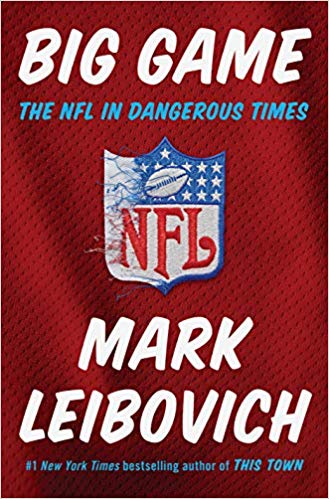You have /5 articles left.
Sign up for a free account or log in.
 Big Game: The NFL in Dangerous Times by Mark Leibovich
Big Game: The NFL in Dangerous Times by Mark Leibovich
Published in September of 2018.
Two numbers define the National Football League.
The first is $25 billion. That the revenue goal that NFL Commissioner Roger Goodell has established for the league by 2027. The NFL is over halfway there, with 207 revenues of $14 billion.
The second is 99 percent. That is the percentage of the 111 brains of deceased NFL players that were diagnosed with chronic traumatic encephalopathy (CTE) as reported in a 2017 study published in the Journal of the American Medical Association.
The question of how to balance those two numbers is the theme of political reporter Mark Leibovich’s Big Game.
Given that this is a Leibovich book, readers can expect to be amused and horrified in equal measures. Leibovich does not disappoint.
It may be that pro football is the only realm of modern American life that is both more fascinating and appealing than politics. We can’t seem to look away from either.
Like Leibovich, I watch a lot of football. In fact, I was watching an NFL game while listening to Big Game.
How do I do this? I genuinely think that my contribution to humanity will be my creation of the audiobook/DVR methodology for watching sports.
Here’s what you do. You record the sports on your DVR. Then you watch the sports with the volume off and your audiobook playing. The recording of the games allows you to fast forward through timeouts and halftime.
Give this is a try. You will find that your brain can absorb and enjoy the audiobook, while simultaneously enjoying the game. This 'multitasking is a myth' is a myth. Different parts of our brain process watching sports and listening to an audiobook independently.
It was very meta watching a Patriots game while listening to Big Game.
Leibovich, like me, grew up just outside of Boston. He in Newton, me in Brookline. We both suffered the Patriots being terrible when we were in high school. As adults, we both saw the rise of the Patriots dynasty.
Some of the most amusing parts of Big Game are the descriptions of the author's attempts to befriend Tom Brady. Against all the odds, Brady seems to grow fond of Leibovich - although there is no indication that the quarterback is a reader of the author’s terrific books on Beltway politics.
Throughout Big Game, Leibovich asks how we can so love watching a game whose price comes in the eventual cognitive, behavioral, and physical limitations that afflict those who play it. Pro football is not just brutal. It is brutal like being in a regularly scheduled weekly car accident.
A theme of Big Game is that, when it comes to the NFL, that we are all complicit. The groups that come off worse in Leibovich’s telling are the NFL, as personified in Commissioner Goodell, and the owners.
Goodell remains tone deaf to the players' attempts to use their national platforms to call attention to structural racism. The billionaire NFL owners are entitled, spoiled, and coddled by state and local governments willing to shell out hundreds of millions in incentives to keep teams from moving. Us fans are unwilling to stop watching, even though we know that we a contributing to the continuance of this brutal spectacle.
The only group that comes out well in Big Game is the NFL players. They are articulate about the tradeoffs that they make between the benefits of economic security and the health risks that they must manage.
When I was a freshman in college (1987), I took a Philosophy course called Present Moral Problems. We studied things like the capital punishment and euthanasia. Today, every university should offer a course on the ethics of pro football. Big Game should be on the syllabus.
Do you have any books about sports to recommend?
What are you reading?




